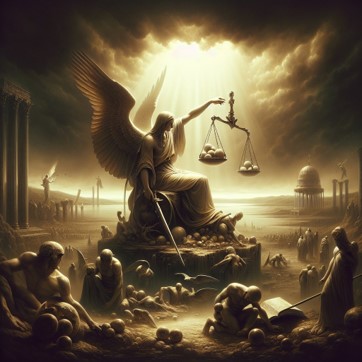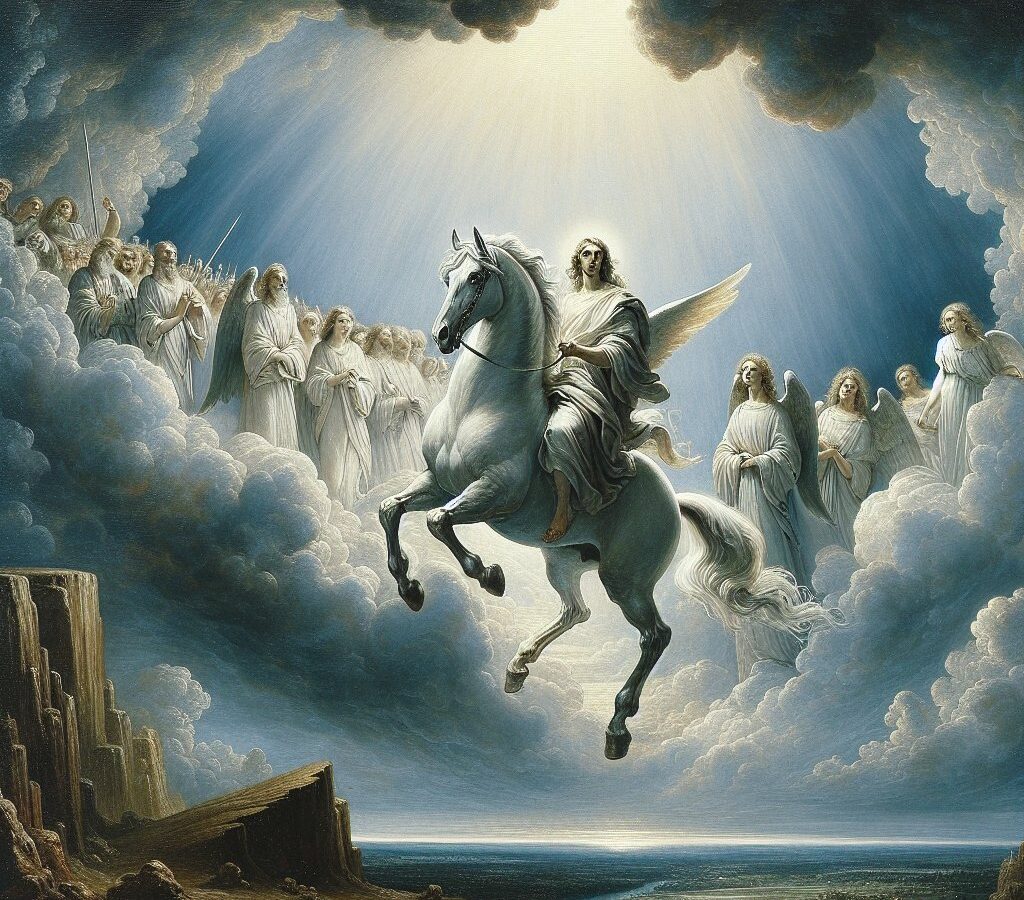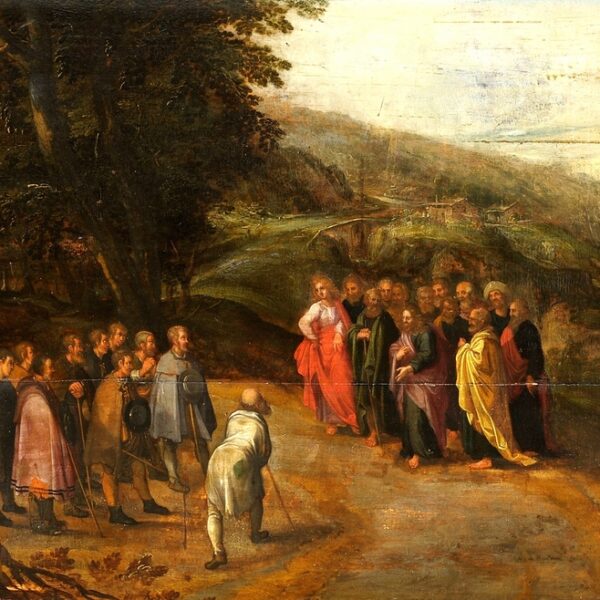Five ways the church gets God’s judgments wrong

God’s justice is a mercy: why we pray for His intervention
October 11, 2024
Justice vs. Charity: when the church and government switch roles
November 4, 2024When was the last time you heard a sermon or a bible study on the judgment of God? It is not a popular topic in the contemporary church.
Yet God’s justice and judgments – His righteous corrections and interventions in the affairs of mankind – are part of His kingdom coming to earth. So why don’t we pray for and anticipate His judgments? 
There are five areas of confusion plaguing the church today which perhaps make God’s people shy from the topic.
- Civic Law vs. God’s Law – When a young man we knew was sentenced to decades in prison for being an accomplice to the murder of a local man, one Christian woman asked, “Where is the mercy in that sentence?” My internal response was, “Is it the job of the judge to operate in mercy, or to apply a judgment within the appropriate parameters of the system?” If the wife and children of the murdered man wish to show the defendant mercy, that is their prerogative. Americans are blessed to live in a nation founded on Judeo-Christian statutes that shun cruel and unusual punishment and insist on due process (granted, we see these principles in jeopardy with the advancement of socialist ideals and lawlessness. I’ll never forget when we received word that friends from Kenya were abruptly detained in Tanzania. Incarcerated without due process, we learned that in Tanzania, like many countries, unless you have a relative willing to bring food to you daily, you don’t get to eat in prison). Could it be that as with Romans 13, we confuse the role of the church and the civic government?
- Godly Compassion or Secular Humanism? Often, when I pray for God’s righteous judgments to bring correction to leaders and institutions, I hear an accusatory voice say, “Well, what about you? You wanted the Lord to show you, mercy, didn’t you?” I’ve come to recognize this voice as not that of the Holy Spirit. I’m grateful for God’s mercy, but if I were in a position in which my decisions were hurting people, His intervention in removing me from such a place would be a mercy – to myself and to others. In fact, I believe that most of us are so heavily steeped in the cultural poison of secular humanism, that we mistake it for compassion. H. Richard Niebuhr observed of the effects of liberalism in the church, ““A God without wrath brought men without sin into a Kingdom without judgment through the ministrations of a Christ without a Cross.” Niebuhr made this observation of the corruption in the evangelical church in the 1930s!
- “We wrestle not against flesh and blood” mantra – Inevitably, whenever you’re in a prayer meeting and someone prays for some wicked leader to be held accountable for his despotism, another Christian in the circle will pipe up, admonishing, “Scripture says we wrestle not against flesh and blood…” While it is true that we wrestle against spiritual rulers of darkness, real flesh and blood people carry out the initiatives of these evil rulers. They need to be stopped or the destruction and tyranny will continue. Whenever I hear a well-meaning Christian offer this as an argument, I cannot help but think of a courtroom scenario in which tearful parents of a murdered child had to sit through the gory details of their little one’s last moments at the savage hands of a sick perpetrator. After the jury unanimously finds the murderer guilty, I picture the judge acting like the church thinks. “Although the defendant is guilty, we wrestle not against flesh and blood. So I’m going to give him a year probation.” Any sane person would decry such a verdict as a severe miscarriage of judgment and realize that the defendant and all others like him would thus be encouraged to carry out further crimes against the innocent.
- “At the end of the age they’ll get their due” – Here’s another Christian catchphrase that I find wholly inadequate. First, it provides no practical solution for right now. Secondly, if God’s will is that none should perish (2 Peter 3:9), why should we be content that an individual be permitted to wreak havoc all his days, only to face God’s wrath on the day of Judgment? Napoleon stands out as perhaps the ultimate example of a tyrant who, when brought to justice, has the opportunity to reflect on life and eternity. Napoleon in exile on St. Helena observed of Christ, “What a conqueror! A conqueror who…wins to Himself not only one nation, but the whole human race. What a marvel! He attaches to Himself the human soul with all its energies. And how? By a miracle which surpasses all others. He claims the love of men – that is to say, the most difficult thing in the world to obtain…..He claims it; He requires it absolutely and undividedly….Alexander, Caesar, Hannibal, Lous X!V strove in vain to secure this…He kindles the flame of a love which causes a man’s self love to die.”
- Last Days Inertia – This final condition in which the church flounders is perhaps the most widespread, even among discerning believers. “Jesus said the Last Days would be like this,” uttered with a resigned sigh. Suppose these are the very last of the Last Days? Suppose, very possibly in fact, that the Man of Perdition (2 Thessalonians 2) is already among the global population? I for one don’t want to help the Antichrist. Why would we stop praying Christ’s kingdom come to earth and His will be carried out just as it is in Heaven? Why would we not now more than ever, resist the tide that seeks to take men to hell with the delusions of this age?
Can you identify with any of these threads in postmodern western evangelicalism? May we continually look to the scriptures for wisdom in these days as we seek to bring His kingdom to earth and ultimately lift Him up, so that He may draw all men unto Himself.






6 Comments
Excellent post, Emily. Well thought out and balanced.
Blessings, Lee Ann
Thanks for reading and commenting, Lee Ann – blessings!
Well said and full of objective vision about the church. I find the true gift of Christ is the giving of hope. It is more settling than all the victories of our struggles. I remember a writer who recently said ” the great tragedy of christianity in our generation is the lost of the blessed hope.” It is such a vital component of faith as defined in Hebrew 11:1 Now faith is the substance of things hoped for, the evidence of things unseen. It requires a genuine expectation but often in observing others it is with desperation, failing to share the redemptive love of Christ return. This is the hope that brought the faith of the gospel to my heart and made me to live the gospel and love the work of Christ for salvation. The kingdom of God is at each of our doors but also doubt is creeping in as govt and culture does what it did to the Pharisees and their pride. It is entrenched in America as it appears our blessings are also blinding us to his glory. Is it any wonder that in Revelation 2-3 in addressing the seven churches, Jesus requires repentance because they have forgotten their first love and he needs the church community to revisit why they came in the beginning. . How sad that they may have gotten God’s righteous judgement wrong!
Wow, yes I hadn’t thought of it from quite that angle. There’s something about our cushy lives here that has even distorted His righteous judgments. It brings to mind what friends from Uganda told us who were making a trip back to Africa to minister to youth at a detention center in Botswana. I asked them how the juvenile detention facilities compared to ours here in the States. My Ugandan friend said, “Are you kidding? The ones here are a paradise!” That in turn brought to mind years ago a comment that was made (and I forget which nation) but how their citizens would prefer to live in prison in the U.S. than as free people there. We’ve no idea really how blessed we’ve been.
Christ knows all and many in America are praying to protect what they see rather than praying to promote a better kingdom to come. Israel is sign number one of the nearness of Christ return soon and very soon. Sign number two is the falling away of Christianity by many of its adherents reflecting a “lack of genuine repentance”. Using the law without much of a heart to deal with sin.
Amen. It’s a time of crumbling of systems. Those who’ve clung to these will be swept away with them. Those who cling to Christ will experience a new glory as things give way to His Spirit.